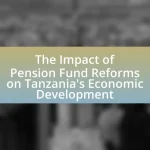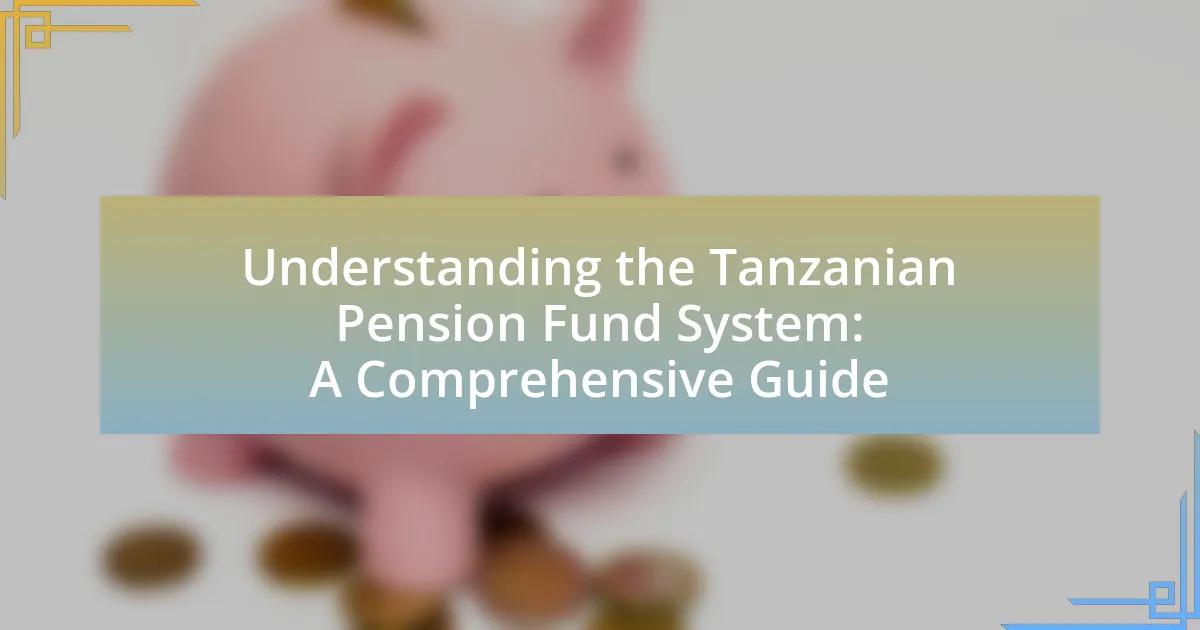Financial literacy is a critical factor influencing pension fund outcomes for members. The article examines how enhanced financial knowledge enables individuals to make informed decisions regarding retirement savings, investment options, and understanding fees, ultimately leading to improved financial security in retirement. It highlights the positive correlation between financial literacy and pension fund performance, emphasizing the importance of concepts such as compound interest, risk management, and asset allocation. Additionally, the article discusses strategies for improving financial literacy among pension fund members, including educational programs and resources, which can significantly enhance their engagement and decision-making regarding retirement planning.

How Can Financial Literacy Impact Pension Fund Outcomes?
Financial literacy significantly impacts pension fund outcomes by enabling individuals to make informed decisions regarding their retirement savings and investments. Individuals with higher financial literacy are more likely to understand the importance of saving for retirement, the benefits of compound interest, and the risks associated with different investment options. Research indicates that financially literate individuals tend to contribute more to their pension plans and select better-performing investment options, leading to improved retirement savings. For instance, a study by Lusardi and Mitchell (2014) found that individuals with higher financial literacy had retirement savings that were 50% larger than those with lower financial literacy. This demonstrates that enhancing financial literacy can lead to better financial outcomes in pension funds, ultimately improving the financial security of retirees.
What is the relationship between financial literacy and pension fund performance?
Financial literacy positively influences pension fund performance by enabling individuals to make informed investment decisions. Research indicates that individuals with higher financial literacy are more likely to select appropriate investment options, leading to better fund performance. For instance, a study published in the Journal of Pension Economics and Finance found that financially literate individuals tend to have higher returns on their pension investments due to their ability to understand and evaluate financial products effectively. This correlation suggests that enhancing financial literacy can lead to improved outcomes for pension fund members.
How does financial literacy influence investment decisions within pension funds?
Financial literacy significantly influences investment decisions within pension funds by enabling fund managers and members to make informed choices regarding asset allocation and risk management. A higher level of financial literacy allows individuals to understand complex financial products, evaluate investment options, and assess the long-term implications of their decisions. Research indicates that financially literate individuals are more likely to engage in diversified investment strategies, which can lead to improved fund performance and better retirement outcomes. For instance, a study by Lusardi and Mitchell (2014) found that individuals with higher financial literacy are more adept at planning for retirement and are less likely to rely solely on default investment options, thereby enhancing the overall effectiveness of pension fund investments.
What role does financial literacy play in understanding pension fund fees and charges?
Financial literacy is crucial for understanding pension fund fees and charges, as it equips individuals with the knowledge to evaluate and compare different investment options effectively. A study by the National Endowment for Financial Education found that individuals with higher financial literacy are more likely to recognize and comprehend the implications of fees on their long-term savings, leading to better financial decisions. This understanding helps members avoid high-cost funds and select options that align with their retirement goals, ultimately enhancing their financial outcomes.
Why is financial literacy essential for pension fund members?
Financial literacy is essential for pension fund members because it enables them to make informed decisions regarding their retirement savings and investments. Understanding financial concepts such as compound interest, risk management, and asset allocation allows members to optimize their pension fund contributions and select appropriate investment options. Research indicates that individuals with higher financial literacy are more likely to engage in effective retirement planning, leading to better financial outcomes. For instance, a study by Lusardi and Mitchell (2014) found that financially literate individuals are more likely to save adequately for retirement, demonstrating the direct correlation between financial knowledge and improved pension fund performance.
How does financial literacy affect retirement planning for individuals?
Financial literacy significantly enhances retirement planning for individuals by equipping them with the knowledge and skills necessary to make informed financial decisions. Individuals with higher financial literacy are more likely to understand complex retirement products, such as 401(k) plans and IRAs, enabling them to select appropriate investment options and contribute adequately to their retirement savings. Research indicates that financially literate individuals are 1.5 times more likely to plan for retirement and save adequately compared to those with lower financial literacy, as shown in a study published by the National Bureau of Economic Research. This understanding leads to better budgeting, risk assessment, and investment strategies, ultimately resulting in improved financial security during retirement.
What are the consequences of low financial literacy on pension fund outcomes?
Low financial literacy negatively impacts pension fund outcomes by leading to poor investment decisions and inadequate retirement planning. Individuals with low financial literacy often fail to understand the complexities of pension plans, resulting in suboptimal asset allocation and missed opportunities for growth. Research indicates that individuals with higher financial literacy are more likely to participate in retirement savings plans and make informed choices about their investments, which can significantly enhance their retirement savings. For instance, a study by Lusardi and Mitchell (2014) found that individuals with low financial literacy are less likely to save for retirement and more likely to withdraw funds prematurely, ultimately jeopardizing their financial security in retirement.

What are the key components of financial literacy relevant to pension funds?
The key components of financial literacy relevant to pension funds include understanding investment options, knowledge of retirement planning, awareness of fees and expenses, and comprehension of risk management. Investment options encompass various asset classes such as stocks, bonds, and mutual funds, which are crucial for making informed decisions about pension fund allocations. Knowledge of retirement planning involves recognizing the importance of saving early and the impact of compound interest on retirement savings. Awareness of fees and expenses is vital, as high fees can significantly erode retirement savings over time; for instance, a 1% increase in fees can reduce retirement savings by 28% over 30 years. Lastly, comprehension of risk management helps individuals assess their risk tolerance and make appropriate investment choices to ensure financial security in retirement.
What specific financial concepts should pension fund members understand?
Pension fund members should understand concepts such as compound interest, asset allocation, risk tolerance, diversification, and retirement income planning. Compound interest illustrates how investments grow over time, significantly impacting the total retirement savings. Asset allocation involves distributing investments among various asset categories to balance risk and return, which is crucial for long-term growth. Risk tolerance helps members assess their comfort level with investment volatility, guiding their investment choices. Diversification reduces risk by spreading investments across different assets, minimizing the impact of poor performance in any single investment. Lastly, retirement income planning is essential for determining how to withdraw funds sustainably during retirement, ensuring financial security. Understanding these concepts enables pension fund members to make informed decisions that enhance their financial outcomes.
How do risk tolerance and asset allocation relate to financial literacy?
Risk tolerance and asset allocation are closely linked to financial literacy, as understanding these concepts enables individuals to make informed investment decisions. Financial literacy equips individuals with the knowledge to assess their risk tolerance, which is their ability and willingness to endure fluctuations in investment value. This understanding directly influences how they allocate assets across various investment vehicles, balancing potential returns against acceptable risks. Research indicates that financially literate individuals are more likely to engage in appropriate asset allocation strategies, leading to better investment outcomes and enhanced retirement security. For instance, a study by Lusardi and Mitchell (2014) found that higher financial literacy is associated with more effective portfolio diversification, which is crucial for managing risk and optimizing returns in pension funds.
What is the importance of understanding compound interest in pension planning?
Understanding compound interest is crucial in pension planning because it significantly impacts the growth of retirement savings over time. Compound interest allows the initial investment to earn interest, and then that interest also earns interest, leading to exponential growth. For example, if an individual invests $10,000 at an annual interest rate of 5%, compounded annually, after 30 years, the investment would grow to approximately $43,219. This illustrates how early and consistent contributions can lead to substantial retirement funds, emphasizing the necessity for individuals to grasp this concept to make informed financial decisions.
How can financial literacy be improved among pension fund members?
Financial literacy among pension fund members can be improved through targeted educational programs and resources. These programs should focus on key topics such as investment strategies, retirement planning, and the benefits of compound interest. Research indicates that individuals who participate in financial education workshops are more likely to make informed decisions regarding their retirement savings, leading to better financial outcomes. For instance, a study by the National Endowment for Financial Education found that participants in financial literacy programs increased their savings rates by an average of 20%. By implementing regular workshops, providing accessible online resources, and offering personalized financial advice, pension funds can significantly enhance the financial literacy of their members, ultimately leading to improved retirement preparedness.
What educational resources are available for enhancing financial literacy?
Educational resources available for enhancing financial literacy include online courses, workshops, books, and financial literacy programs offered by various organizations. For instance, the National Endowment for Financial Education provides free resources and courses aimed at improving financial knowledge. Additionally, platforms like Coursera and Khan Academy offer structured courses on personal finance topics. The Jump$tart Coalition for Personal Financial Literacy also provides a wealth of materials and resources for educators and students. These resources are designed to equip individuals with the knowledge necessary to make informed financial decisions, ultimately leading to better management of personal finances and improved outcomes in areas such as pension funds.
How can employers support financial literacy initiatives for their employees?
Employers can support financial literacy initiatives for their employees by providing access to educational resources and workshops focused on personal finance and retirement planning. Research indicates that companies offering financial education programs see a 20% increase in employee engagement and a 15% reduction in turnover rates. By partnering with financial experts to deliver tailored training sessions, employers can enhance employees’ understanding of pension plans, investment options, and budgeting strategies, ultimately leading to improved financial decision-making and better pension fund outcomes.

What are the potential benefits of improved financial literacy for pension fund members?
Improved financial literacy for pension fund members leads to better decision-making regarding retirement savings and investments. When members understand financial concepts, they are more likely to choose appropriate investment options, which can enhance their retirement outcomes. Research indicates that individuals with higher financial literacy are more adept at managing their portfolios, resulting in increased savings rates and better asset allocation. For instance, a study by Lusardi and Mitchell (2014) found that financially literate individuals are 50% more likely to plan for retirement effectively, demonstrating a direct correlation between financial knowledge and improved financial outcomes.
How does enhanced financial literacy lead to better retirement outcomes?
Enhanced financial literacy leads to better retirement outcomes by equipping individuals with the knowledge and skills necessary to make informed financial decisions regarding savings, investments, and retirement planning. Individuals with higher financial literacy are more likely to understand the importance of saving early, the benefits of compound interest, and the various investment options available, which can significantly increase their retirement savings. Research indicates that financially literate individuals are 1.5 times more likely to plan for retirement and save adequately compared to those with lower financial literacy levels. This understanding directly correlates with improved financial behaviors, such as increased contributions to retirement accounts and better risk management, ultimately resulting in a more secure financial future during retirement.
What impact does financial literacy have on member engagement with pension funds?
Financial literacy significantly enhances member engagement with pension funds. Members who possess a strong understanding of financial concepts are more likely to actively participate in their pension plans, make informed investment choices, and monitor their retirement savings. Research indicates that individuals with higher financial literacy are 1.5 times more likely to engage with their pension funds compared to those with lower financial knowledge, as evidenced by a study published in the Journal of Pension Economics and Finance. This increased engagement leads to better retirement outcomes, as financially literate members are more adept at navigating complex pension options and understanding the long-term benefits of their investments.
How can financial literacy reduce the risk of pension fund mismanagement?
Financial literacy can significantly reduce the risk of pension fund mismanagement by equipping individuals with the knowledge to make informed financial decisions. When members understand investment principles, risk assessment, and the importance of diversification, they are better positioned to evaluate the performance and strategies of their pension funds. Research indicates that higher financial literacy correlates with improved investment outcomes; for instance, a study by Lusardi and Mitchell (2014) found that individuals with greater financial knowledge are more likely to participate in retirement savings plans and make prudent investment choices. This understanding helps mitigate the potential for mismanagement by fostering accountability and encouraging members to engage actively with their pension fund’s governance.
What strategies can members implement to enhance their financial literacy?
Members can enhance their financial literacy by engaging in structured educational programs, utilizing online resources, and participating in workshops focused on financial management. Structured educational programs, such as those offered by financial institutions or community organizations, provide comprehensive knowledge on budgeting, saving, and investing. Online resources, including financial literacy websites and mobile applications, offer interactive tools and information that can be accessed at any time, making learning convenient. Workshops, often led by financial experts, allow members to ask questions and receive personalized advice, reinforcing their understanding of financial concepts. According to the National Endowment for Financial Education, individuals who participate in financial education programs demonstrate improved financial behaviors, such as increased savings rates and better investment decisions.
How can members utilize online tools and resources for financial education?
Members can utilize online tools and resources for financial education by accessing interactive platforms, webinars, and educational websites that provide comprehensive information on financial literacy. These resources often include budgeting calculators, investment simulators, and courses tailored to understanding pension funds and retirement planning. For instance, the National Endowment for Financial Education offers free online courses that cover essential topics such as saving for retirement and understanding investment options, which can directly enhance members’ knowledge and decision-making regarding their pension funds.
What role do workshops and seminars play in improving financial literacy?
Workshops and seminars play a crucial role in improving financial literacy by providing structured learning environments where individuals can gain essential knowledge and skills related to personal finance. These educational events often cover topics such as budgeting, investing, and retirement planning, which are vital for making informed financial decisions. Research indicates that participants in financial literacy workshops demonstrate increased understanding of financial concepts and improved financial behaviors, leading to better management of personal finances and enhanced outcomes in areas like pension fund participation and savings rates. For instance, a study by the National Endowment for Financial Education found that individuals who attended financial workshops reported a 20% increase in their financial knowledge and a significant improvement in their ability to plan for retirement.
What are the best practices for fostering financial literacy in pension fund contexts?
The best practices for fostering financial literacy in pension fund contexts include providing tailored educational programs, utilizing clear and accessible communication, and leveraging technology for engagement. Tailored educational programs address the specific needs of diverse member demographics, ensuring that information is relevant and comprehensible. Clear communication involves using straightforward language and visual aids to explain complex financial concepts, which enhances understanding. Leveraging technology, such as mobile apps and online platforms, facilitates interactive learning experiences and allows members to access information at their convenience. Research indicates that organizations implementing these practices see improved member engagement and decision-making, ultimately leading to better retirement outcomes.





